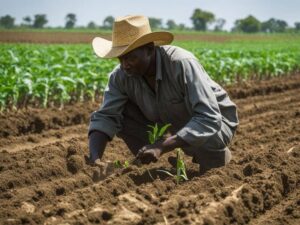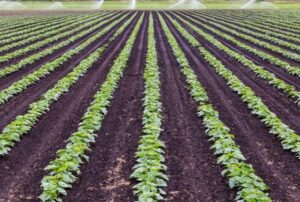Top 10 Organic Farming Crops for Sustainable Agriculture
Organic farming has emerged as a cornerstone of sustainable agriculture, focusing on preserving soil health, reducing chemical usage, and promoting biodiversity. One of the key components of organic farming is selecting the right crops. Choosing crops that thrive in organic systems and support sustainability is vital for maximizing yields and promoting environmental well-being.
In this blog, we’ll explore the top 10 organic farming crops that contribute to sustainable agriculture, offering nutritional, ecological, and economic benefits.
1. Wheat
Wheat is a staple crop globally and an excellent choice for organic farming. It thrives in diverse climates and contributes to food security. Organic wheat cultivation relies on crop rotation, green manures, and compost to maintain soil fertility and reduce pests. Its robust root system improves soil structure and helps prevent erosion, making it an integral part of sustainable farming systems.
Benefits:
- High global demand.
- Enhances soil health through deep-rooting systems.
- Can be intercropped with legumes for nitrogen fixation.
2. Rice
Rice is a staple for over half the world’s population, making it a vital organic crop. In organic systems, rice can be grown using innovative methods like the System of Rice Intensification (SRI), which conserves water and enhances yields. Combining rice farming with aquaculture, such as fish or duck integration, supports biodiversity and reduces pests naturally.
Benefits:
- Feeds a large population sustainably.
- Supports biodiversity through integrated farming.
- Reduces chemical dependency with natural pest control.

3. Corn (Maize)
Corn is versatile, serving as food for humans and feed for animals. Organically grown corn benefits from sustainable practices such as crop rotation and cover cropping, which protect soil from erosion and improve fertility. Organic corn also provides a chemical-free option for creating products like cornmeal, syrup, and oil.
Benefits:
- High yield and diverse uses.
- Improves soil through crop rotation.
- Reduces reliance on synthetic fertilizers and pesticides.
4. Tomatoes
Tomatoes are a high-demand crop with significant economic value. In organic farming, tomatoes are grown without synthetic pesticides, relying instead on biological controls and organic compost to thrive. Tomatoes are also excellent for small-scale organic farmers due to their short growth cycle and ability to fetch premium prices in organic markets.
Benefits:
- High market demand.
- Thrives in compost-rich soils.
- Can be grown in small spaces or intercropped.
5. Carrots
Carrots are a root vegetable rich in nutrients and widely used in diets worldwide. They are a fantastic organic crop because they grow well in healthy, well-aerated soil, which organic farming promotes. Carrots benefit from companion planting with herbs and flowers that repel pests naturally, eliminating the need for chemicals.
Benefits:
- Nutritional powerhouse with high consumer demand.
- Enhances soil structure during growth.
- Complements other crops in companion planting systems.
6. Soybeans
Soybeans are a critical crop for both food and soil health. As a legume, they fix nitrogen in the soil, reducing the need for synthetic fertilizers. Organic soybeans are used to make various products, such as tofu, soy milk, and biodiesel. Farmers benefit from their role in crop rotation systems, which prevent soil depletion and control weeds naturally.
Benefits:
- Fixes nitrogen, improving soil fertility.
- Supports sustainable food and energy production.
- Works well in crop rotation systems.
7. Lettuce
Lettuce is a fast-growing leafy green, ideal for organic farming. It thrives in nutrient-rich soils and is a favorite for direct-to-consumer sales in farmers’ markets and organic stores. By avoiding synthetic chemicals, organic lettuce remains free of harmful residues, making it a healthy choice for consumers.
Benefits:
- Quick growth cycle allows multiple harvests per season.
- High demand in organic markets.
- Minimal pest issues when paired with companion planting.
8. Potatoes
Potatoes are one of the most widely grown and consumed vegetables in the world. Organically grown potatoes depend on healthy soil, crop rotation, and biological pest management. They are highly versatile and can be sold as fresh produce or processed into organic chips, fries, or dehydrated products.
Benefits:
- High calorie and nutritional value.
- Thrives in diverse climates.
- Reduces soil erosion when grown in rotation.
9. Barley
Barley is an ancient grain with modern applications, from brewing beer to making health-conscious foods like soups and salads. It grows well in organic systems, relying on minimal inputs and thriving in crop rotation systems. Barley’s deep root system improves soil aeration and moisture retention, crucial for long-term sustainability.
Benefits:
- High adaptability to different climates.
- Supports soil health through deep rooting.
- Excellent choice for diversified farming.
10. Quinoa
Quinoa is a superfood that has gained immense popularity due to its nutritional profile. It is high in protein, gluten-free, and packed with essential nutrients. Organically grown quinoa supports biodiversity by promoting polyculture systems. It requires minimal inputs and grows in diverse conditions, making it a resilient choice for sustainable agriculture.
Benefits:
- High market value as a superfood.
- Grows in challenging conditions, promoting food security.
- Supports biodiversity when grown in polyculture systems.
Key Practices for Organic Crop Success
To ensure the success of these crops, farmers must adopt best practices that align with organic and sustainable principles:
- Crop Rotation: Prevents soil depletion, disrupts pest cycles, and enhances nutrient availability.
- Composting: Provides organic matter to improve soil fertility and structure.
- Companion Planting: Uses natural relationships between crops to deter pests and support growth.
- Biological Pest Control: Incorporates beneficial insects, birds, and microorganisms to manage pests.
- Water Conservation: Practices like drip irrigation and mulching conserve water resources.
The Future of Organic Farming Crops
As the demand for organic produce grows, farmers have an opportunity to make a significant impact on sustainability. By focusing on crops that are environmentally friendly, nutrient-rich, and economically viable, they can support ecosystems and provide healthier food options for consumers.
The transition to organic farming requires dedication and knowledge, but the long-term benefits—healthier soils, reduced chemical reliance, and improved biodiversity—make it a worthwhile pursuit for farmers and communities alike.
By prioritizing these top 10 organic farming crops, we can collectively move closer to a sustainable agricultural future.














3 comments